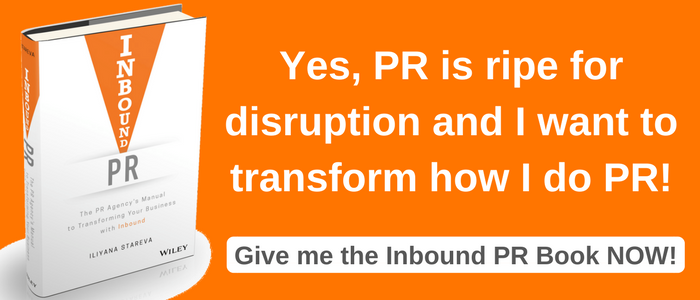
Thanks to Pascal Landshöft - my colleague and friend from HubSpot - for this highly educating guest post!
Sales is a core function of every business. PR people, however, often fail to integrate it into their communications activities.
In my current role as a sales expert at HubSpot, I personally found that the most successful agencies I work with prioritize and professionalize sales more than the less successful ones.
And they have a real process in place.
To help you define one for your PR agency, here are some thoughts on why and how to enter this thought process to grow beyond your current potential.
Why Should PR Agencies Care about Sales?
I have been working in sales for small and medium-sized businesses for ten years.
Very often I find that the CEO is the one and only person at the company selling. This holds especially true for PR agencies. The main observation that I make is that usually in these cases the sales and marketing teams are not aligned or the company has a single point of failure who is the founder him/herself.
"Single point of failure" is a concept in IT and engineering, describing points in any given system which, should they break down, bring the entire complex to a standstill. If the leader of an agency keeps all the reigns in sales and then becomes unavailable due to e.g. sickness, long-term travel or maternity leave, this is usually a huge blow to the team which gets left behind.
Another reason why sales is important for PR agencies is the end game. If there is no one from the staff or no heir to take over the business, it will have to be sold or closed down. If you want to sell the business to a new owner or to the bank and the CEO is the only active salesman around, his book of business basically retires with him. A good investor will notice this and say something like:
"If you retire from this agency, your clients will retire with you. I am therefore buying an empty shell. It is still of interest to me to invest, but not at the price you named. I am thinking more of..."
Leaders who have invested the time and effort to establish a process for creating leads and closing them into customers are in a far better position when this time comes.
Another advantage of being good at sales and having a process for it is that it will free up time for the CEO to focus on more strategic matters. Sales can then either be done in less time or delegated to a sales team. This will ensure that the agency will stay relevant when the market gets disrupted like the internet did because the CEO can analyze the trends in time and build new branches and revenue streams accordingly, before the old core business will be at peril. A good example here are print agencies which have become more and more obsolete and have to fight for survival. Had their CEOs had more time, they would not have missed the SEO or app marketing trend.
No matter how good your project team is, you will always lose some clients. They will go bankrupt, outgrow your agency or you will outgrow them, or they only wanted to engage with you for a certain period of time, but did not tell you. There can be many reasons for losing clients but the fact is that it will happen at some stage. If you don't pay attention to sales and have a waiting list of clients or if you only start selling when one client leaves, you will then have to live with the fact that there might be a whole in your budget and you have to lay off staff. I found that to be troublesome, especially for small agencies who have only one or two clients which account for 70 - 90 % of their yearly revenue.
When there is a financial crisis, which we have seen quite a few of lately, it also becomes paramount to be good at sales. The less there is to go around in a market, the fiercer the competition becomes. Good sales skills will prepare you for getting the business, even if you have to roll up your sleeves and fight for it. I often see that especially marketers do not really like this part of the agency business as they prefer to deliver good quality content which makes the world better and shy away from conflicts. If you want to do great in life, you will have to ruffle at least some feathers, especially when times get tough.
If you stay in business for more than a decade, it is very likely that your business model will get disrupted at least once from any one aspect of the business. Good sales skills will keep your company afloat for longer until you have figured out a way how to deal with the disruption and compensate for it.
What is Sales?
If you open up a dictionary, you will find this definition of sales:
"Sales: The exchange of a commodity for money; the action of selling something."
I personally like to describe sales as the art to make supply and demand meet at the right point of time at the right place.
If you've studied sales and marketing at university, you'd most likely have come across Adam Smith's model of supply and demand. While Adam Smith conveniently assumes that everybody participating in the global market has all the knowledge needed, no transport cost and will always act in their own best interest, reality shows that this is not the case. While helpful in theory, I personally find that in reality sales compensates for many of the shortcomings in his model. The seller will inform about transport cost, fill knowledge gaps about the product and its best use and what purpose it fulfills so that the buyer will exchange money if he sees that it meets his or her demand.
The challenge is to uncover the need and the urgency of the client and to faithfully describe the functionalities of your product in a way that will be relevant to your client.
To perfect this process and to identify whether the client will be a good or bad fit is what distinguishes good from bad salespeople because usually they are the better informed when it comes to making a decision whether the client actually chooses to his own benefit or not.
How Inbound Sales is Different from Traditional Sales
When done right, the seller will not waste time speaking with prospects who do not have a need for the product or service provided.
The research time spent will also be focused on diving deeper on the leads already available, rather than finding leads at all.
This brings up the success rates and lowers frustration levels on both sides of the bargain as a customer as well as a salesman are at less risk to waste their time and/or enter a win/lose deal. A win/lose deal occurs when only one party is gaining from the exchange. It won't take long until the other party realises that they have entered an unsatisfying arrangement and they will make themselves heard. This usually will harm the reputation of the side who took advantage of the other party.
For all of the above, Inbound Marketing can help to minimize the risk involved and maximize the chances of a win/win deal.
Why Should You Have a Sales Process
A good sales process always ensures that you know whether you have gathered the right information at the right time from the customer in order to qualify them to do business with you and your company to both theirs and your satisfaction.
If you don't have a sales process, you don't know whether or not you have done your job, whether your client has a real need and whether there's waste in time and resources.
Even if you get the sale in, the aftermath of it is usually a perceived bad quality of service on the clients side or the feeling that you have sold yourself under value because your client is not paying all of the hours you invest in servicing them.
In addition, a sales process ensures that a PR agency can scale and hire more sales staff who they can teach this defined and documented method to. This will enable long-term growth and quality assurance when you scale and get bigger.
How Do I Start the Sales Process
The start of a sales process ties back to the overall strategy of your agency and which buyer persona's you have defined. Each lead that is passed onto sales will be checked whether it is worth to be pursued or not based on the ideal client profile that has been established with your buyer persona definition.
The first step of every sales process is therefore the prioritisation of the currently available leads against an established set of values and ideal profile to be pursued where the company can deliver the most value in the shortest amount of time (this usually translates into most sales in the shortest amount of time).
The 8 Key Steps of the Sales Process
- Prioritisation of leads against ideal client profile
- Discover whether the client:
- Has a challenge or goal
- Wants help to resolve it
- Want your agency to help resolve it
- Investigate whether the client can do business with you based on their:
- Goals
- Plans
- Challenges
- Timeline
- Budget
- Authority
- Investigate the detailed facts around these points
- Show the client based on their input how you are going to solve for them
- Make an offer based on what you have shown
- Close the sales
- Handle the objections of the client along step 1 - 7
Each of these steps is worth a blog post in its own right. If you have no sales process in place yet, take this as a template and work your way from there. I've found this to be the best skeletal structure to build a well-oiled sales department after working for three big American IT companies.
How Long Does a Sales Cycle Last?
For agencies, I usually see 3 to 6 months as a normal sales cycle.
However, this can vary greatly between different agencies and based on the clients they engage with.
As a general rule of thumb, the more decision makers and the more money is being moved, the longer the sales cycle will be.
How Do I End a Sales Cycle?
When it comes to ending a sales cycle, the most obvious reason is when you've made the sale.
However, the more important and harder one is to know when to move onto a better prospect. Here again come the importance of the buyer persona and the sales process into play. If you know who your ideal client is, you will also already know who you should not engage with and the sales cycle will therefore end early or not even start.
Your sales process will do the same when you have a good fit company which is not yet ready or not willing to do business with you. If certain information is not available at defined stages where it should be available, you either didn't do your job as a seller, or the company you are trying to sell to is just not ready for your product or service yet. Here it is better to move on, rather than press a sales which will do more harm than good in the long run. Life is too short to enter bad business relationships.
To end the sales cycle I use a technique called "Go negative" on the client. You will politely point out that you feel like talking to you is of no priority for the client for the time being and pull out of the interaction. If the client comes back to you, you know they are involved and sincere. If they back out, better to know earlier rather than later when everyone has already made a big investment in the negotiations.
Wrapping Up
All in all, I have seen that PR agencies who take an active interest into building a professional sales department and process are more successful in the long term and their CEOs seem to be more relaxed, satisfied and happy. The ones I talk to who keep sales to themselves and have no process whatsoever are usually more stressed, less successful and find it a lot harder to achieve their agency's vision and true positioning.
What does your sales process look like?
P.S. Pascal is not only passionate about sales, but also about fitness, so I encourage you to check out his advice on his blog, for example these two pieces: "How to lose weight like a boss" or "Do you need protein to get stronger".








